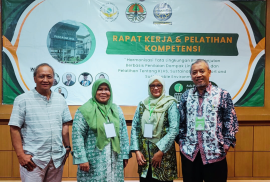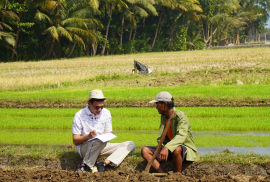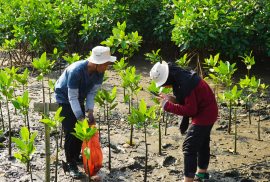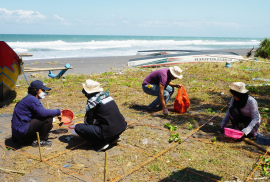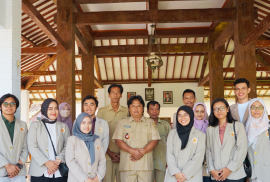On August 21–23, 2024, representatives from the Master’s and Doctoral Programs in Environmental Science at the UGM Graduate School, Dr. Sudaryatno, M.Si., and Dr. Nurul Khakhim, M.Si., attended the 11th National Working Meeting (Rakernas) of the Association of Environmental Science Study Programs (PEPSILI) in Bali. PEPSILI is a legally recognized network organization that facilitates collaboration among all environmental science study programs across Indonesia, aiming to advance environmental science in accordance with the Tri Dharma of Higher Education, particularly in education, research, and community service.
Master News
Students of the Master of Environmental Science program conducted a social analysis in the coastal areas of Jatikontal and Gedangan Villages, Purwodadi District, Purworejo Regency, as part of the Field Study Program held on 15–19 July 2024. The Environmental Science Program at UGM recognizes that communities play a crucial role in environmental stewardship. The serious impacts of insufficient public awareness regarding waste management extend beyond environmental degradation to issues of public health and disruptions to marine ecosystems. Therefore, students were assigned to evaluate community perceptions and participation in waste management. They distributed questionnaires containing questions on the characteristics, perceptions, and participation of respondents regarding waste management.
In addition to conducting physical and social analyses, graduate students of the Environmental Science Master’s Program carried out a biotic assessment along the coastal areas of Jatikontal and Gedangan Villages, Purwodadi District, Purworejo Regency, as part of the Field Study (KKL) program held on 15–19 July 2024. Mangrove biodiversity in coastal regions plays a critical role in maintaining biotic ecosystem balance, protecting shorelines from erosion, and mitigating the impacts of natural hazards. For this reason, the students conducted a Mangrove Health Index (IKM) assessment to determine the condition and health status of mangroves in the coastal zones of both villages. Transects were placed using purposive sampling at three points considered to be representative of field conditions. The parameters used in the Mangrove Health Index included tree density, leaf morphometrics, species diversity index, evenness index, and mangrove species count.
The Environmental Science Master’s Program conducted a physical environmental analysis along the coastal areas of Jatikontal Village and Gedangan Village, Purwodadi Subdistrict, Purworejo Regency, during the Field Study Program held on 15–19 July 2024. Physical factors—particularly waste—play a significant role in influencing the balance of marine ecosystems. Therefore, the Environmental Science Program instructed students to carry out an evaluation of coastal cleanliness by using plastic waste as an indicator and assessing the potential hazards posed by dangerous objects found along both coastal areas. The activities were conducted rigorously and systematically. Students collected waste samples within transects and sub-transects, sorted them, and recorded their findings. In addition to identifying waste types, the analysis also included waste weight, composition, and density.
The Environmental Science Study Program, Graduate School, conducted a Field Study (Kuliah Kerja Lapangan/KKL) in Jatikontal Village and Gedangan Village, Purwodadi Sub-district, Purworejo Regency, from 15–19 July 2024. Purworejo Regency has significant potential for coastal area development, with a coastline stretching 21 kilometers. However, one of the most pressing environmental issues along the coastal area is waste pollution originating from multiple sources. Therefore, the Environmental Science Program engages students through this Field Study to contribute to addressing these challenges. The activity was supervised by Dr. Bachtiar Wahyu Mutaqin, S.Kel., M.Sc., Prof. Dr. Ig. L. Setyawan Purnama, M.Si., and Dr. Rika Harini, S.Si., MP.

